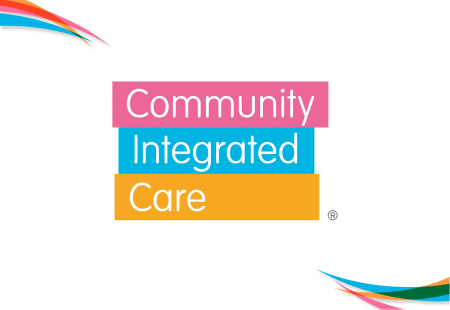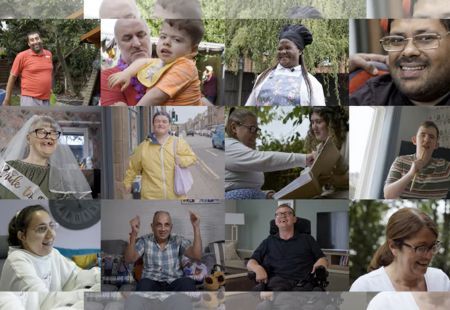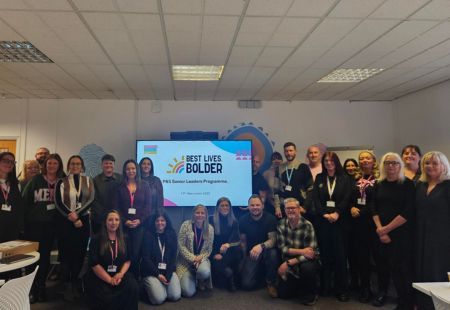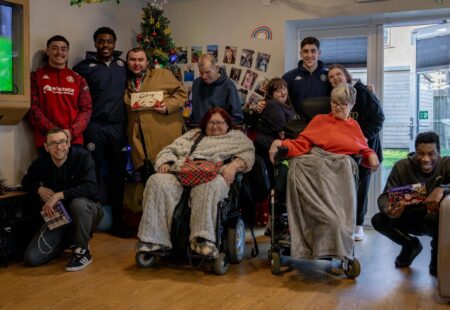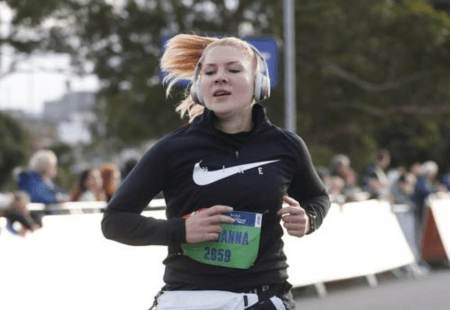
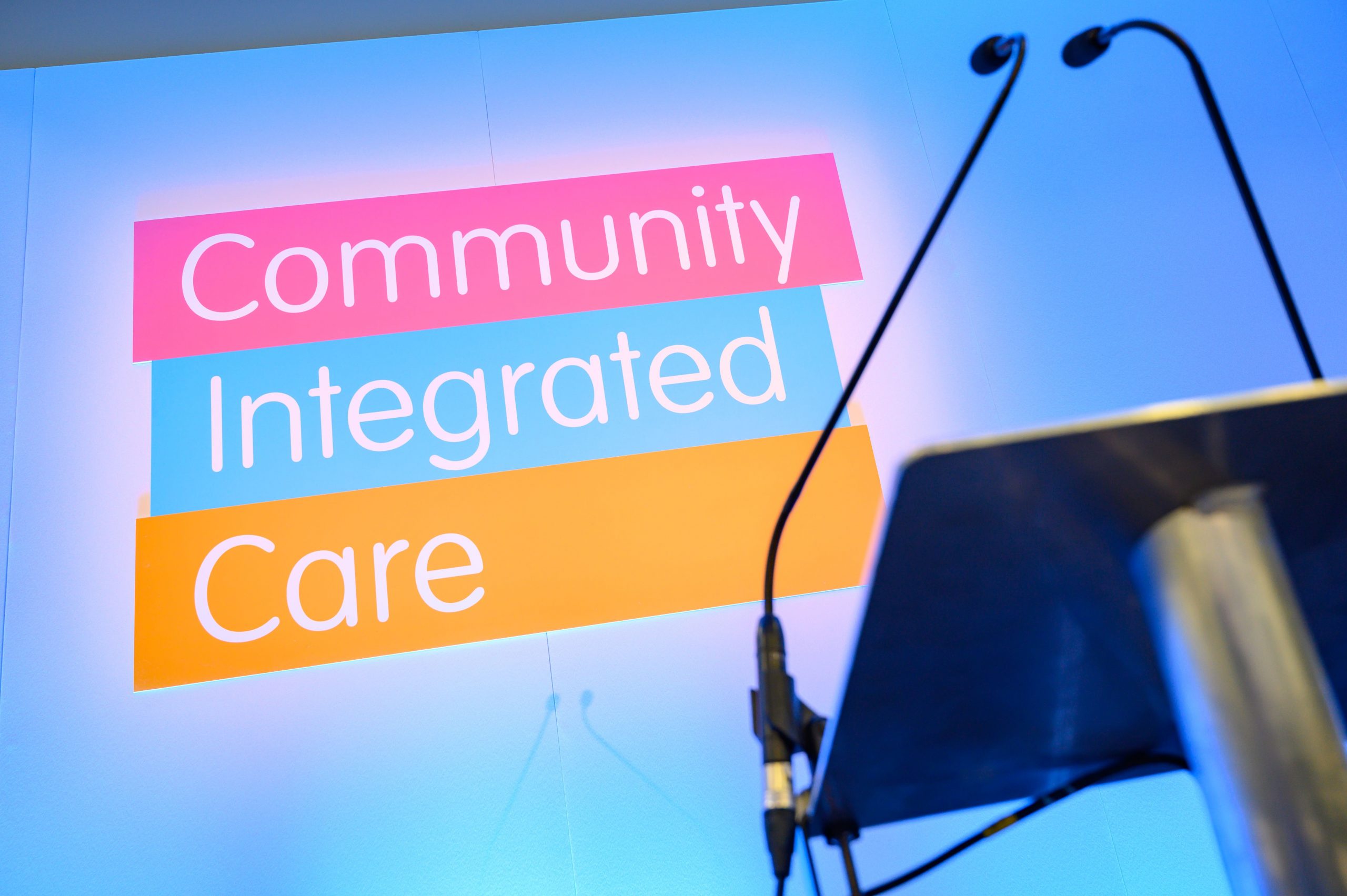
News
21/06/2022
We launch our Care To Play impact report!
Community Integrated Care are proud to launch our new report, highlighting the incredible impact that table tennis can make on across social care settings in promoting accessible activity, social connection and friendships.
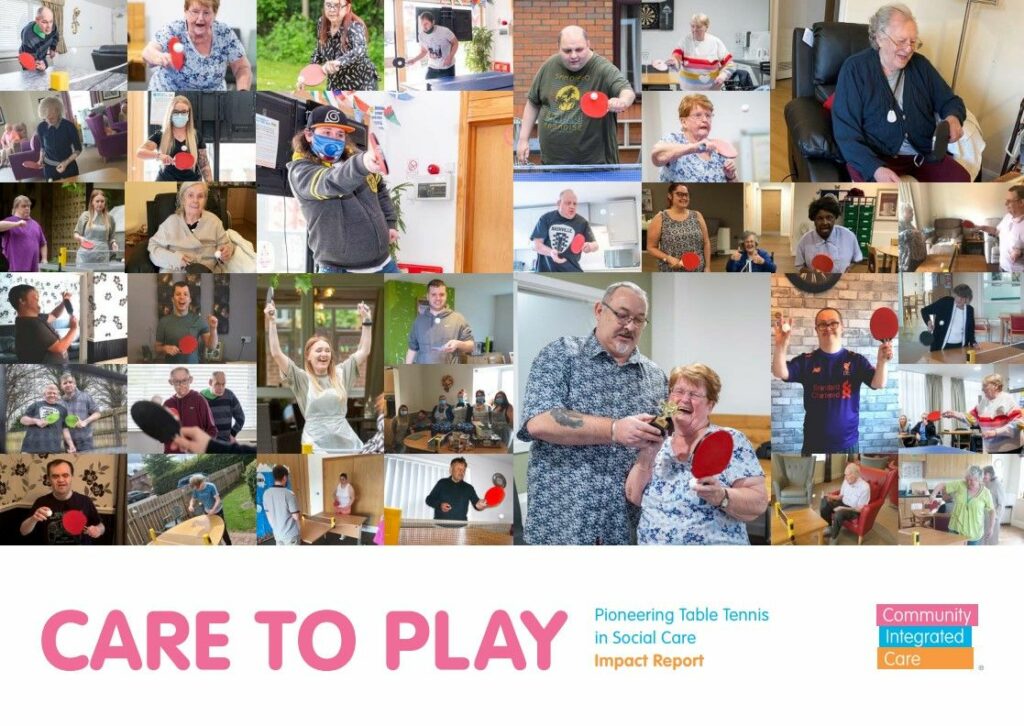 Following a two-year exploration of the sport, in partnership with Table Tennis England, the findings of this project have now been published in our new impact report, ‘Care To Play – Pioneering Table Tennis in Social Care’.
Following a two-year exploration of the sport, in partnership with Table Tennis England, the findings of this project have now been published in our new impact report, ‘Care To Play – Pioneering Table Tennis in Social Care’.
The report finds that table tennis offers a uniquely inclusive platform for physical activity, with significant adaptability for people who have complex physical and learning disabilities.
Our charity has seen that table tennis can be used in many innovative ways to enhance support – including being effectively used with talking therapies in mental health services. Importantly, it highlights the fun and excitement that it can bring to care services, as a low cost and low-complexity sport – helping to combat isolation, form friendships and promote a positive culture.
We’ve utilised table tennis in many services – from our specialist dementia care services, to community projects for people who have learning disabilities – since 2018.
However, in June 2020, as Covid-19 brought lockdown to the UK, we innovatively identified that table tennis could maintain physical activity in our services, as a socially distanced sport. Partnering with Table Tennis England, we introduced the sport across our services and assessed its impact.
This programme saw more than 200 of Community Integrated Care’s services receive table tennis starter packs, enabling thousands of people to remain active during the pandemic. This initial effort has since been furthered as the programme has evolved, and we’ve created table tennis hubs in 27 of our larger services, benefitting almost 1500 people, and creating a number of bespoke activity clubs.
With such an expansive programme, we have explored the benefits of table tennis across a comprehensive range of people suppotred – including people with learning disabilities, autism, mental health concerns, dementia, acquired brain injuries, and other complex needs. These collectively represent a true cross-section of the social care sector in England, enabling first-of-its-kind insights into the application of the sport in social care.
The delivery of this programme was enabled by our creation of www.CareToPlay.co.uk. This unique training guide to promoting table tennis in social care, which uses short and engaging videos, meant that our workforce was capable of effectively delivering the activity. This resource was made freely available to the public and care sector and has since been adopted by several other care and NHS organisations.
The new impact report can be downloaded now at www.CommunityIntegratedCare.co.uk/tabletennis. It provides several innovative examples of the life-changing impact of the sport.
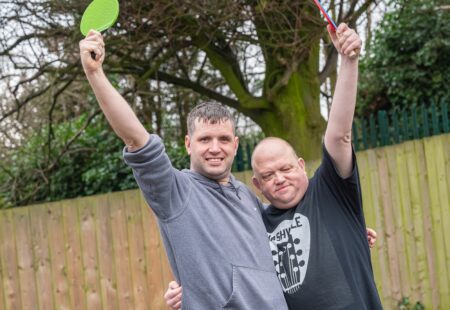
One of our charity’s specialists for Positive Behaviour Support, Vickie Martin, said, “During the pandemic, I spent extended time in one of our most complex autism services, where we have 12 people living together with complex needs. Nobody could go out and do their usual planned activities, and there were times when people were very upset and frustrated.
“Table tennis gave them something positive to focus on in their day. It gave people time for themselves or with their support workers, and through the Care To Play training, our colleagues knew how to adapt the activity depending upon the needs of the individual.”
The report finds that table tennis has a unique adaptability, as both a group or individual sport. Vickie highlights: “Table tennis can be very social, giving people a reason to come together, or it can be enclosed and more solitary if that’s what you need. Simply hitting the ball against a wall and using a repetitive action is very soothing for some.”
It finds that the sport can help promote a friendly and welcoming culture, bringing fun and friendship into social care settings. This has proved particularly beneficial in mental health services, helping people to find the confidence to integrate with others and supporting their recovery.
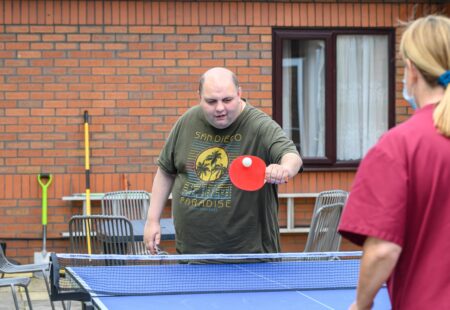 Alan Howells, one of our specialist Mental Health Nurses, explains, “Dealing with complex mental health issues can be a solitary experience and people can get quite isolated. Table tennis is another tool to help people to develop their confidence to build bonds with others.”
Alan Howells, one of our specialist Mental Health Nurses, explains, “Dealing with complex mental health issues can be a solitary experience and people can get quite isolated. Table tennis is another tool to help people to develop their confidence to build bonds with others.”
The report provides examples of how people have felt it easier to open up and share their feelings, during a friendly game – providing a novel alternative to more traditional mental health assessments.
Alan says, “When dealing with complex mental health issues, people can lack motivation, and find it difficult to engage in activities, or indeed with others. Table tennis has helped counteract some of those issues.”
The impact of the sport as a social and adaptable game, is a recurring theme across all care settings – from support for young adults who have learning disabilities, through to engagement with people in the later stages of life.
The report provides a powerful case study of the life-changing impact this social connection had on people during lockdown.
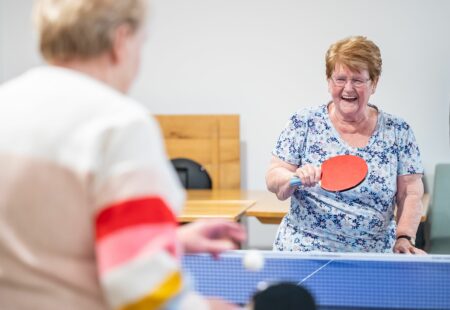 The Watch Factory, one of our Extra Care services based in Prescott that supports people with a range of disabilities, provided hundreds of hours of one-to-one table tennis activities in people’s flats during the pandemic, to offer company and stimulation for people who did not receive daily support and therefore would be alone.
The Watch Factory, one of our Extra Care services based in Prescott that supports people with a range of disabilities, provided hundreds of hours of one-to-one table tennis activities in people’s flats during the pandemic, to offer company and stimulation for people who did not receive daily support and therefore would be alone.
Marie Godfrey, who was the Watch Factory’s Service Leader in the midst of the pandemic, explains in the report, “We soon saw the power of this – even with a short visit, people would be talking about it for days.”
She adds, “It’s been so important for mental health, stimulation, and motivation for all sorts of people, including our staff. I really feel that table tennis has brought people together.”
Growing Momentum
This momentum for the sport continues to grow within our charity, as hundreds of people we support are set to enjoy special ‘ping pong parties’ during upcoming The Commonwealth Games.
Our partnership with Table Tennis England has also recently been shortlisted for the ‘Sporting Chance’ honour at the National Learning Disability and Autism Awards.
John Hughes, Director of Partnerships at Community Integrated Care, says, “Table Tennis has proved to be an incredible addition to so many of our services, promoting fun, friendship and physical activity, in an accessible and inclusive way.
“Our ‘Care To Play’ report shares several profound examples of how this simple sport has positively impacted people’s lives – both during the worst of the pandemic, and now as we look to happier days ahead. We hope that this report inspires others to replicate and build upon our successes.
“We are grateful to our partners Table Tennis England for their incredible vision, in being so open to exploring the potential health and social impact of their sport in social care. Our thanks also go to Sport England, who have been instrumental in our efforts to expand physical activity options for people who access social care.”
Colin Eley, Partnerships Manager at Table Tennis England, says, “ We’re well-versed on the benefits Table Tennis can have on a person’s well-being. What we haven’t necessarily been able to establish previously is the extent that the sport can benefit audiences who have complex physical or learning disabilities. Working with Community Integrated Care, we have not only been able to establish a wealth of insight and information to support our theories, but also positively impact the lives of people who typically may not have opportunities to engage with the sport.
Table Tennis is for everyone, and since inception, partnering with Community Integrated Care has always felt like a necessity for Table Tennis England. Social Care as a sector is where we know our sport can thrive and make an impact. This was powerfully demonstrated when lockdown hit, and the sport continued to support people’s physical and emotional health.
This is just the beginning of what we hope will be an embedded culture of the sport within Community Integrated Care and the social care sector as a whole. Special thanks to the charity’s teams who shared our vision to take Ping Pong to the people!”

